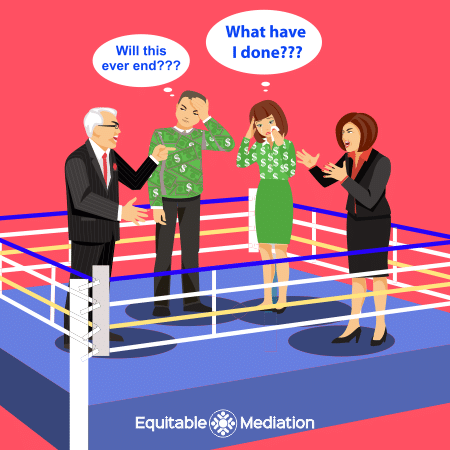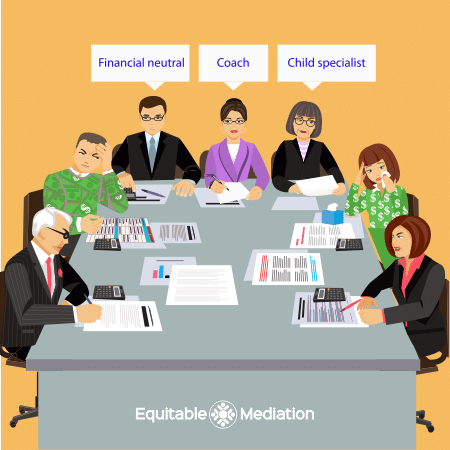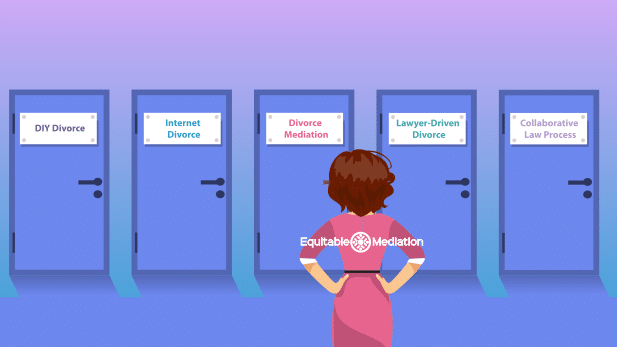What Are My Divorce Options?
I’m sure you’ve heard the statistic that 50% of marriages end in divorce. But I bet you never thought your marriage would be one of them.
No one does.
Making the decision to leave your marriage was (or will be) one of the biggest and most difficult decisions you have ever made in your life.
And you didn’t take this decision lightly.
But what you may not have realized at the time was that this would not be the only important decision you’d need to make. It was actually the first of many…
The next thing you’ll need to decide is how to get a divorce.
So what ARE the divorce options available to you? And how do you choose the option that’s right for you in your particular situation?
We'll answer those questions and more in this post.
Ultimately, this is your divorce and how you choose to proceed is entirely up to you.
But with so much at stake, you’ll want to choose wisely!
Criteria for Determining the Divorce Option Right for You
Are Lawyers Required for Divorce?
The 5 Divorce Options:
Next Steps for How to Get a Divorce & Other Useful Resources
Criteria for Determining the Divorce Option Right for You
Divorce is very personal to the individuals experiencing it. Every situation is different and there is no “one-size-fits-all” solution.
Just because a particular divorce method worked well for a friend or co-worker, there is no guarantee it will work well for you. Conversely, if a particular option may not have worked for someone else, it doesn’t necessarily mean it isn’t a viable option for you.
Choosing the divorce option right for you and your children ultimately depends on a variety of tangible and intangible factors.
Here are just a few:
1. The Complexities of Your Case:
- The duration of your marriage;
- Whether or not you and your spouse have children together;
- Whether or not you and your spouse own property / real estate together;
- Whether or not you have jointly owned assets and/or debts;
- Whether or not there are significant differences in your incomes;
- Whether or not one or both of you have variability in your income;
- Whether or not one or both of you own a business or are self-employed;
- Whether or not one or both of you are unemployed;
- Whether or not there is domestic violence, substance abuse or incarceration.
Keep in mind there are many other factors that add to the complexity of a divorce case.
2. The Level of Thoroughness Desired For Your Agreement (Quality):
How comfortable are you with ambiguity in your final agreement?
Do you want a thorough agreement that clearly spells out in great detail everything you agreed upon to ensure to the best of your ability that you’ll never need to return to family court?
Or are you comfortable with a basic agreement that may leave some items open to interpretation and possibly making a return to court in the future necessary?
To what level do you want/need an agreement that is customized to your unique situation or the unique needs of your children?
For example, if you or your divorcing spouse lives or works in a different state or one of you travels frequently for your job, a basic parenting plan just won’t do. Instead, you’ll need a flexible and customized parenting arrangement that meets your unique needs and minimizes disruption to the kids’ routines.
On the other hand, if you and your spouse intend to live down the street from each other, don’t travel for work and will share in the care of your children equally, a basic agreement may be sufficient.
3. Power/Fairness:
How much control do you want over your divorce agreement?
Some people prefer to have complete control over the terms of their agreement while others would prefer that a judge or the courts dictate the terms of their settlement in their divorce decree.
4. Child-Focused:
To what degree do you wish to have your children’s needs put first?
To what level of detail do you need to spell out your co-parenting arrangement?
Remember, once your marriage ends, you’ll no longer be husband and wife, but you’ll still be Mom and Dad.
You’ll need to interact with each other as co-parents for many years to come as you remain active in your children’s lives.
5. Relationship Dynamic with Your Spouse:
What level of trust exists between you and your spouse?
Are you both willing to be open and honest during your negotiations? Or do you feel there may be assets or issues that your spouse will knowingly conceal from you?
To what degree are you and your spouse prepared to work together?
Are you willing to collaborate with each other even though it might be difficult at times? Or have communications broken down so severely that you believe it will be impossible to cooperate?
To what degree are you and your spouse willing to compromise?
Are you willing to negotiate? Or do you think your spouse will dig their heels in and refuse to try to find common ground?
6. Stress:
How much emotional capital are you willing to invest to get through the actual divorce process?
Some people are more willing or able to power through it on their own while others may prefer to have help or support from outside professionals.
What level of confrontation are you willing to withstand?
Are you looking for a way to end your marriage as peacefully as possible? Or are you prepared to engage in a confrontational, all-out war if necessary to fight for what you believe you are entitled to?
7. Cost:
How much are you willing to spend on the divorce proceedings?
Do you want the least expensive option available for how to end your marriage? Or are you willing to spend more in exchange for a greater level of service and/or a higher quality and more thorough agreement?
8. Speed:
How quickly do you want the divorce process to be completed?
Is it more important for you to get through the process as quickly as possible or are you willing to add a bit of extra time to the process if it means a more thorough or higher quality agreement?
9. Professional Assistance:
What level and type of professional assistance you desire?
Do you want an expert to guide you and/or your spouse through all of the steps? Or do you prefer to take on the divorce process on your own with no outside involvement?
Are you seeking legal advice? Or would you prefer to make your own informed decisions?
As you can see, there are many factors to consider when deciding how to get a divorce.
Which items from the preceding list are most important to you?
It’s important to keep these things in mind as you learn about the five divorce methods because it will help you narrow down the divorce options to the one that will best meet your needs.
Are Lawyers Required for Divorce?
Some of the divorce process options involve lawyers and some don’t. Involving family law attorneys is a matter of personal choice and situational circumstances.
There are no laws that require you to involve a family law attorney at any point in how to get a divorce. Not even for the filing.
And many couples specifically choose not to.
But in cases of financial fraud, mental incapacity or domestic violence/abuse, involving an attorney may be necessary.
The 5 Options for Divorce:
The laws and availability of some of these methods vary from state-to-state, but generally speaking, there are 5 divorce options in the United States.
They are:
Do-It-Yourself Divorce
Internet Divorce
Divorce Mediation
Lawyer-Driven Divorce (traditional divorce)
Collaborative Law Process
Option 1 for How to Get a Divorce: Do-It-Yourself

How Does a Do-it-Yourself Divorce Work?
In a Do-It-Yourself Divorce, there is no involvement from outside professionals. Instead, the couple is solely responsible for carrying out all of the steps to divorce.
The two spouses work together to identify the relevant issues, come to agreement on all issues, draft all required paperwork and file their divorce with the courts*.
* In the United States, each individual has the right to represent themselves in court.
There are a number of things you need to know before you make the decision to choose Do-It-Yourself Divorce:
You will both have a high level of control over your result.
This is because you and your spouse will be deciding on all of the conditions of your divorce.
A high level of trust would need to exist between the two of you.
This is because you and your spouse need to come to an agreement on all pertinent issues.
You must both be willing to work together and you must both be willing to compromise.
In a divorce, you'll need to "give to get," but doing so may be challenging depending on how you're feeling about your spouse.
You must be ready to invest a high level of emotional capital.
The divorce process is not easy to navigate and can get very stressful.
You could inadvertently agree to something that is not fair or in your best interests or the best interests of your children.
This will be dependent in part on your knowledge of divorce issues in your particular state (parenting plan / time sharing, child support, alimony which is referred to as spousal support in some states and maintenance or spousal maintenance in others, marital property division which is referred to as community property in some states and equitable distribution in others) as well as your financial acumen and knowledge of the financial issues relevant to your situation.
Or, if there is a power imbalance between you and your spouse, one of you might give in just to make the process be over and done with instead of standing up for yourself to get what is fair.
You could forget to discuss critical relevant issues.
Especially if “you don’t know what you don’t know.” This can lead to one of two problems. Either your settlement being rejected by the courts, forcing you to retain an attorney to fix any issues with it, or a hole in your agreement that won't become apparent until some point in the future when it's too late.
Your agreement may not be as thorough as you want it to be.
This will depend on your knowledge of the surrounding issues and subject matter relevant to your case, your ability to clearly spell out the details of your agreement, and your skill level in drafting the required paperwork.
The process could become confrontational if your case is more complex or problematic.
How Much Does a Do-It-Yourself Divorce Cost?
Do-It-Yourself Divorce is the lowest cost option. The only fees you’ll pay are those directly related to the paperwork and court filing process.
A Do-It-Yourself Divorce ranges from $300 to $1,500, depending on the complexity of your case and specific court and paperwork fees.
How Long Does a Do-It-Yourself Divorce Take?
A Do-It-Yourself Divorce can take a few weeks to a few months.
It depends on how quickly you and your spouse can resolve the relevant issues, draft and file the paperwork and get a court date.
Do-It-Yourself Divorce may be an option to explore further if all of these conditions apply:
The complexities of your case are low;
A high level of trust exists between you and your spouse;
You and your spouse are in agreement on all issues and are willing to work together;
You don't want/need a customized agreement;
You don't want any professional involvement whatsoever;
There is nothing legally preventing you from being able to interact with your spouse;
You are willing to sacrifice the thoroughness of your agreement for a low cost.
Option 2 for How to Get Divorced: Internet Divorce

How Does Internet Divorce Work?
Internet Divorce is similar to the “Do-It-Yourself” divorce option in that the couple is responsible for undertaking all of the steps to divorce. But instead of having to pinpoint the relevant issues on their own, a website or software program helps by identifying the basic issues that an average divorcing couple faces.
The spouses would still need to come to an agreement on all issues, but the website leads them through an online interview with a series of pre-defined questions that they would answer.
Finally, instead of the couple having to draft all required paperwork themselves, the website outputs the paperwork based on the way the interview questions were answered.
The couple would then print out that paperwork, sign wherever required, and then follow the instructions provided by the website as to how to file with the courts.
There are a number of things you need to know before making the decision to choose Internet Divorce:
Only one spouse registers for the internet divorce service.
That means that only one of you will actually be using the system and answering questions for both of you. Therefore, you will both need to not only be in complete agreement on all relevant issues in advance of starting the online interview, but a high degree of trust will also need to exist between the two of you.
Whoever is answering the questions technically has control over choosing the answers and may or may not enter what you both agreed to in advance.
You may end up having to involve attorneys in your divorce.
Couples who pursue a DIY or Internet Divorce typically do so because they don't want to involve attorneys. And like a DIY divorce, parties may find themselves unsure on how to proceed and need to consult with an attorney.
Some Internet divorce systems offer attorney assistance from within their website, giving one party the chance to pay to be connected with a lawyer who can answer their questions, and offer advice.
While at first, this may sound appealing, but if you and your spouse specifically chose an Internet divorce to avoid the cost or involvement of attorneys, you'll be doing the very thing you didn't want to do.
It's important to note an attorney can only represent one party. So if you're the spouse who registered for the system, and reached out to the attorney from within it, it is you who will get your questions answered and be represented, which may cause friction with your unrepresented spouse.
You must both be willing to work together and you must both be willing to compromise.
You must both be willing to invest a high level of emotional capital.
You will both have a high level of control over your result.
This is because you and your spouse will be deciding on all of the conditions of your divorce.
You could inadvertently agree to something that is not fair or in your best interests or the best interests of your children.
This will be dependent in part on your knowledge of divorce issues in your particular state as well as your financial acumen and knowledge of the financial issues relevant to your situation.
Or, if there is a power imbalance between you and your spouse, one of you might just give in just to make the process be over and done with instead of standing up for yourself to get what is fair.
You could make costly mistakes with far-reaching consequences.
Perhaps you incorrectly calculated child support. Or improperly estimated alimony.
Little mistakes can add up to big dollars and cost you additional time and money to correct them in the future.
There is little to no opportunity to customize your agreement.
This is because you’ll be answering basic pre-programmed questions.
The system may not address all of the complexities that your case requires.
This may impact the quality of your agreement and leave you with partially or unresolved issues (or the need to involve attorneys.)
The system may not be accurate with respect to specific laws in your state.
While Internet divorce service providers offer “a money-back guarantee” if your paperwork isn't accepted by the courts, if that does, in fact, happen, you would still need to find another way to file your divorce.
Issues pertaining to children may only be partially complete.
For example, Internet Divorce service providers send you to a free online calculator that will only estimate the amount of child support instead of providing you with an exact amount.
The process could become confrontational if your case is more complex or problematic.
How Much Does Internet Divorce Cost?
These days, the cost to register with an Internet Divorce Service can vary widely, from as low as $120 to as high as $4,500 as more and more providers are flooding the space.
In addition, just like each of the other divorce options, the court fees related to the paperwork and filing of the divorce range from $300 to $1,500.
So the total cost for an Internet Divorce is between $420 and $6,000.
How Long Does an Internet Divorce Take?
Internet Divorce can take a few weeks to a few months, depending on how quickly you and your spouse can resolve the relevant issues, complete the online interview to produce the paperwork, file the divorce and get a court date.
If you and your spouse are in agreement on all issues, completing the online interview can take just a few hours.
A Low-Cost Internet Divorce may be an option to explore further if all of these conditions apply:
The complexities of your case are relatively low;
There is a high level of trust between you and your spouse;
You and your spouse are in agreement on all issues and are willing to work together;
You don’t want/need a customized agreement;
You want minimal outside involvement and you are comfortable using a computer and the internet to perform tasks online;
There is nothing legally preventing you from being able to interact with your spouse;
You are willing to sacrifice the thoroughness of your agreement for a low cost.
Otherwise, you will need to pay significantly more for an Internet divorce or consider an alternative path to divorce.
Option 3 for How to Get a Divorce: Divorce Mediation

How Does Divorce Mediation Work?
Divorce Mediation is a cooperative process whereby a neutral third-party (the Mediator) knowledgeable in dispute resolution and the issues of divorce helps the couple through the steps required.
The Mediator will:
- Help the couple identify all relevant issues that need to be resolved in part by guiding them through a process called Discovery.
- Educate both spouses on the relevant issues that pertain to their case so that informed decisions can be made by both spouses.
- Help the divorcing spouses create an agreement that is customized to the unique needs of their particular situation and/or the unique needs of their children.
- Guide negotiations between the spouses on issues of disagreement.
- Draft a comprehensive Memorandum of Understanding which contains the substance and details of the parties' agreements.
There are a number of things you need to know before making the decision to choose Divorce Mediation:
You will both have a high level of control over your agreement because you both have a direct say in creating its terms and conditions.
Mediation allows you and your spouse to discuss and resolve all issues that pertain to your unique situation.
And your agreement can also be customized to your unique needs.
In mediation, your children take center stage.
You will be making decisions as parents, keeping your children’s best interests in mind.
You and your spouse will be empowered to make informed decisions that are right for you.
In a mediated divorce, you won’t get legal advice and the mediator will not tell you what to do. Instead, you and your spouse will be fully empowered to make your own decisions.
The mediator does not “fight” for one spouse, but instead, advocates for both of you and your children.
Because the mediator is a neutral third party who doesn’t take sides, their job is to get you an agreement that you both find fair.
Mediation is a transparent process and requires full disclosure.
You and your spouse will need to both be willing to engage in a good faith negotiation. You must both be willing to cooperate and compromise.
You do not need to agree on all issues in order to use mediation.
The mediator is a skilled professional and will help you negotiate all of the required divorce issues - even the ones you don't agree on.
If you hire a competent mediator, you'll get a high quality agreement that is thorough, detailed and easy to execute.
Your agreement will be drafted in plain English allowing you and your spouse to clearly understand what you’ve agreed to and what you need to do to in order to abide by it.
It will also be customized to your unique needs.
The speed and pace of the mediation process will be controlled by you and your spouse.
In mediation, you will never be rushed or forced through your negotiations as you and your husband or wife will get to direct the speed and pace of the process.
Your agreement will only be final when you and your spouse both say it is.
In mediation, you will have the opportunity to change your mind on issues as many times as you need to throughout the process.
You must both be willing to give the mediation process the time, focus and attention it deserves.
The mediation process requires active participation by you and your spouse.
Mediation is a non-adversarial and cooperative process.
You will both have the opportunity to voice your concerns, be heard and have a direct say in the terms of your settlement.
The terms of your divorce will be confidential and private.
How Much Does Divorce Mediation Cost?
The total cost of an uncontested divorce when mediation is utilized typically ranges from $6,000 to $10,000 per couple, depending on case complexity and the state you reside in.
How Long Does Mediation Take?
Divorce Mediation itself can take 2-4 months, and the speed of the process is in large part directed by the spouses.
In most situations, all relevant issues can be resolved in two to four sessions.
Once all issues are resolved and paperwork drafted, the speed of the divorce process is related to the time it takes to file the divorce and get a court date.
Divorce Mediation may be an option to explore further if all of these conditions apply:
The complexities of your case are medium to high;
You and your spouse are willing to engage in a good faith negotiation and be honest throughout the process;
Both of you are willing to mediate;
You want a thorough and customized agreement tailored to your unique needs or the unique needs of your family;
You want an experienced professional to help you but you want to divorce without a lawyer.
You want full control over the terms of your divorce agreement;
There is nothing legally preventing you from being able to interact with your spouse;
You want the divorce process to be as cost-effective as possible without sacrificing quality.
Option 4: Lawyer-Driven Divorce

Please note: This is an oversimplified description of how a Lawyer-Driven Divorce works. In reality, there are many more steps involved and the steps vary from state-to-state and county-to-county. In addition, the process itself may vary significantly from state-to-state and lawyer-to-lawyer.
How Does Lawyer-Driven Divorce Work?
Each spouse hires a lawyer for divorce to help them complete the process. But unlike a mediator, who is neutral and works for both spouses, a lawyer can only represent one spouse.
For this reason, the lawyer’s job is to advocate for the one spouse who hired them with the goal of attaining the most favorable outcome for their client.
There is no requirement that the other spouse must hire his/her own lawyer, but it’s common that when one spouse retains a lawyer, the other spouse does the same.
For the sole purpose of describing a Lawyer-Driven Divorce as simplistically as possible, in the following example, Sally is the wife and Bob is the husband.
We are assuming that each spouse has hired his/her own lawyer. We are also assuming that each spouse is being reasonable and that each lawyer is being reasonable, though it is common for attorney-driven divorces to escalate into something less cooperative.
Here’s how it begins:
Sally’s lawyer files a Complaint for Divorce with the court requesting the divorce on behalf of her client, Sally. (this step sometimes happens in the middle of the process or at the end of the process)
Bob is then officially notified by being served with that Complaint and a Summons by the sheriff of the county in which he resides. (this step may or may not be required – it varies by state)
Sally works with her lawyer to identify the relevant issues. Bob does the same thing with his lawyer.
Each spouse will need to provide financial information to their respective lawyers regarding their income, marital property, assets, debts, insurance, etc.
Sally’s lawyer sends a letter to Bob’s lawyer requesting Bob’s financial information.
Bob’s lawyer sends a letter to Sally’s lawyer requesting Sally’s financial information.
Sally’s lawyer gives Sally advice on what she thinks the terms of the divorce settlement might be if decided by a judge. Sally may or may not agree with her lawyer’s advice. Ultimately, it is up to Sally to decide what she wants to do.
Sally tells her lawyer how she wants the marital assets and debts to be divided, how she wants the children to be cared for (visitation, custody, support, etc.), the amount and duration of alimony that she is willing to pay/receive (if appropriate) as well as other conditions of the divorce.
Sally’s lawyer sends a letter to Bob’s lawyer outlining Sally’s proposed settlement terms.
Bob’s lawyer discusses the proposed terms with Bob. Bob’s lawyer gives Bob advice on what he thinks Bob should/should not agree to. Bob may or may not agree with his lawyer’s advice.
Bob decides whether or not he agrees with any/all of the proposed terms.
If Bob agrees with all of the proposed terms, Bob’s lawyer communicates that information to Sally’s lawyer.
Sally’s lawyer then proceeds to draft the paperwork, file the divorce with the courts and request a court date and final hearing.
That was a very high level overview of a Lawyer-Driven Divorce that went relatively smoothly with agreement successfully reached on all issues on the first pass.
But a lawyer-driven divorce is highly unpredictable and in nearly all cases, the issues are not resolved as simply as that.
If Bob does not agree with any/all of the proposed terms, the process will continue…
The two lawyers will then enter into negotiations on behalf of their clients regarding the unresolved issues.
By this point (if it hasn’t happened already), there is a good chance the relationship dynamic between the spouses is highly confrontational and extremely emotionally charged.
If agreement cannot be reached on one or more of the issues, the divorce will continue through the court system (litigation).
In a litigated divorce there are three steps:
Step 1: Court-ordered Mediation
The spouses will typically be ordered by the courts to try to resolve their issues using mediation.
But unlike traditional private mediation (see Option 3) which is voluntary, court-ordered mediation is mandated.
You may or may not have a choice as to who you mediator is.
You, your spouse and your lawyers will sit with the divorce court-appointed mediator to try and resolve the issues.
The goal is for you and your spouse to resolve all of your issues outside of a courtroom so that you do not need to have a trial.
Note: Trials are extremely expensive, time-consuming and are not good use of taxpayer money.
For example, if you and your spouse can’t agree on a custody arrangement, you’ll work with a parenting coordinator who is trained by the courts to mediate parenting disputes.
If the issues are related to something financial like alimony, child support or how to divide your assets or liabilities, you may work with one or more legal and/or economic experts. They will attempt to help you resolve the financial issues between you. Or in some states, tell you their opinion on what your economic settlement would likely be if your case went to trial and a judge decided the outcome.
After your court appointed mediation is over, you and your spouse may either choose to accept the settlement terms proposed by these people or take your chances and go to the next step in the litigation process: Direct attorney negotiation.
Step 2: Direct Attorney Negotiation
In Direct Attorney Negotiation, you and your spouse will each sit in separate rooms. You’ll tell your lawyer what you want and are willing to accept and your spouse will tell their lawyer the same. Your lawyers will then meet and attempt to negotiate a settlement on your behalf based on the input they received from you and what they each think is fair.
If this approach is unsuccessful and there are still issues that are unresolved, you will go to the next step for your contested divorce: Trial.
Step 3: Trial
.webp?width=450&name=divorce-litigation-is-destructive%20(1).webp)
Unlike what you see on television, trials aren’t neatly wrapped up in 60 minutes or less with the parties and family law attorneys smiling and shaking hands.
Trials can last years, cost hundreds of thousands of dollars and are open to the public.
A court date will be set. And you and your divorce attorney will prepare your case as will your spouse and his/her attorney.
Documents will be presented to the courts throughout the trial. Arguments regarding the merits of your position will be made. Witnesses or other experts will be brought in to testify. Even your children may be called to the stand.
All of this takes place in court in front of a judge who will ultimately decide your fate.
There are a number of things you need to know before making the decision to choose Lawyer-Driven Divorce:
If you are unable or unwilling to communicate with your spouse, a lawyer can be a buffer.
If you’ve been defrauded by your spouse, litigation can provide you with relief.
If you have an issue that you’re unable to resolve by any other means, litigation may be able to get you a settlement when no other option can.
In a Lawyer-Driven Divorce, you will get legal advice.
It can be reassuring for some to have an outside professional available to answer questions and represent them.
Be aware that some lawyers will tell you what to do and some lawyers will act as if they know what’s best for you instead of asking you what you want.
Lawyer-Driven Divorce is volatile and can get ugly very quickly.
If one or more of the issues cannot be resolved easily, the process will drag on and head towards litigation. It will also continue to get more hostile and more expensive.
Litigation destroys families.
It’s unlikely you’ll be able to effectively co-parent your children with your ex-spouse after undergoing a litigated divorce.
Litigation is financially ruinous.
With the average cost ranging from $78,000 to $200,000, you will risk putting yourself in a financial hole you’ll have a hard time climbing out of.
A Lawyer-Driven Divorce is extremely stressful.
The back and forth. The arguing. The motions. The waiting around. The lack of control. The mounting legal bills...
Divorce litigation is a matter of public record.
If your case goes to trial, anyone can sit in the courtroom and watch what’s going on. Your friends. Your family. Your neighbors. Anyone.
Divorce laws aren’t as clear as you might expect.
There is no magic rule book that points out who gets what in a divorce.
And in reality, the issues that need to be resolved in a divorce have less to do with laws and more to do with money and negotiation.
The outcome of your case may be decided by the competency of your attorney.
Some lawyers use strategies to confuse, manipulate or outsmart their opposition. Lawyers each have their own personality and style.
Some can be hostile and deceptive; others can be irrational and unreasonable.
If you hire an incompetent or unreasonable lawyer, you may find yourself with an unfavorable outcome.
And if your case goes to trial and the judge makes their decision, you might find that you are not satisfied with the ruling.
How Much Does a Lawyer-Driven Divorce Cost?
Divorce lawyers charge for time, which means that the client will receive a bill for every communication the lawyer undertakes on the client’s behalf.
That includes, but is not limited to: every phone call, e-mail, letter drafted, meeting, court appearance, etc.
The rate for a divorce lawyer ranges from $200/hour to $500/hour.
To start, most lawyers require an initial retainer of $3,500 to $10,000 per spouse depending on the complexity of your case and how well you and your spouse get along. The retainer is only the beginning for most people.
Costs for a standard Lawyer-Driven Divorce can range from $20,000 to $32,000. Costs for a divorce that goes to trial vary, but can range from $78,000 to $200,000 per couple.
How Long Does Divorce Litigation Take?
A Lawyer-Driven Divorce can take 18 months to three years.
The speed of the process is determined by how long it takes for both sides to reach agreement on all issues and coordination of schedules for everyone involved (you, your lawyer, your spouse, their lawyer, court-appointed mediator(s), early settlement panel (if necessary), child specialists (if necessary), the court, etc.
There can be significant downtime and waiting around.
Divorce Lawyers may be an option to explore further if any of these conditions apply:
Your case is problematic.
There is no degree of trust left between you and your spouse and/or you have been defrauded by your spouse.
You and your spouse cannot or will not communicate.
Your spouse is unwilling to cooperate with your desire to get a divorce.
You want legal advice and an advocate to represent you.
There is a restraining order in place and/or you are concerned for your safety.
You have no other viable divorce options.
Option 5 for How to Get Divorced: Collaborative Law Process

How Does Collaborative Law Process Work?
The Collaborative Law Process (also referred to as Collaborative Divorce) is a hybrid between lawyer-driven divorce and divorce mediation.
Each spouse hires his/her own lawyer trained in the collaborative process to represent them. Both spouses and their lawyers sign a contract called a “participation agreement” that states that they are all committed to using cooperative techniques rather than combative tactics to negotiate the divorce issues.
If agreement cannot successfully be reached on all relevant divorce issues using the Collaborative Process, the lawyers will be disqualified from representing the spouses as they continue into the litigation process.
In the Collaborative Process, a series of meetings take place between both spouses and both lawyers and possibly other outside professionals as needed to negotiate and try to come to agreement on the issues.
To better illustrate this option, let’s return again to Sally and Bob:
Sally works with her lawyer to identify the relevant issues. Bob does the same thing with his lawyer.
Each spouse will need to provide financial information to their respective lawyers regarding their income, marital property, assets, debts, insurance, etc.
Sally’s lawyer sends Sally’s financial information to Bob’s lawyer.
Bob’s lawyer sends Bob’s financial information to Sally’s lawyer.
Sally’s lawyer gives Sally advice on what she thinks the terms of the divorce settlement would be if decided by a judge. Sally may or may not agree with her lawyer’s advice.
Sally tells her lawyer how she wants the marital assets and debts to be divided, how she wants the children to be cared for (visitation, custody, support, etc.), the amount and duration of alimony that she is willing to pay/receive (if appropriate) as well as other conditions of the divorce.
Bob’s lawyer gives Bob advice on what he thinks the terms of the divorce settlement would be if decided by a judge. Bob may or may not agree with his lawyer’s advice.
Bob tells his lawyer how he wants the marital assets and debts to be divided, how he wants the children to be cared for (visitation, custody, support, etc.), the amount and duration of alimony that he is willing to pay/receive (if appropriate) as well as other conditions of the divorce.
Sally and her lawyer meet with Bob and his lawyer a number of times to negotiate the terms of the divorce.
If there are areas of disagreement with regard to custody or visitation of the children, a parenting specialist may be brought into the process by Sally’s lawyer or Bob’s lawyer. The parenting specialist would help the parties resolve any non-financial issues directly related to parenting or child custody.
If there are areas of disagreement with regard to dividing marital assets or debts, one or more financial professionals may be brought into the process by Sally’s lawyer or Bob’s lawyer. The financial professional(s) would help the parties resolve any financial issues in the areas of child support, alimony or the distribution of the parties’ marital assets and liabilities.
If there are areas of disagreement with regard to the earning potential of a spouse, one or more employability experts may be brought into the process by Sally’s lawyer or Bob’s lawyer. The employability expert(s) would make a determination as to the employability of one spouse in a certain field and estimate what they think that spouse could earn.
Depending on the complexity of the case or situation, a therapist and/or conflict coach may be brought in to the collaborative process as well.
If agreement can be reached on all issues, the lawyers draft the paperwork, file the divorce with the courts and request a court date and final hearing.
However, if agreement cannot be reached on any/all of the issues, the collaborative process will end and the divorce will go through the court system.
And litigation will begin…
There are a number of things you need to know before making the decision to choose the Collaborative Law Process:
If all of the issues can be resolved using the Collaborative Process, you can avoid going to trial.
In the Collaborative Process, you, your spouse and your attorneys will all agree to try and work all relevant issues out without resorting to litigation.
You’ll have an advocate who will give you legal advice.
Since your lawyer will be representing you and only you, he/she can give you advice throughout the proceedings and tell you what to do.
If your spouse won’t volunteer requested financial information, your lawyer can file paperwork with the courts requiring your spouse to comply.
You will need to be willing (and legally able) to sit in the same room with your spouse.
Like mediation, the collaborative process requires you to sit together and work through the issues.
Just as with mediation, your proceedings and the terms of your divorce will be confidential.
You’ll still be engaged in an adversarial process.
Even though you’re all in the same room, a collaborative divorce can result in an “us versus them” mentality since each of you is represented by counsel.
If you are not both willing to compromise, the Collaborative Process will not be successful.
If the Collaborative Process is not successful, you’ll need to hire new lawyers and start over again.
Your divorce will head into litigation and the attorneys that represented you during the Collaborative Process can no longer represent you.
The Collaborative Process can get very expensive and there are no guarantees of success.
You will not only need to pay your lawyer for all of their time, you’ll also have to pay for any other outside professionals brought into the process.
This includes the financial expert(s), parenting coordinator, conflict coach, employability specialist(s), etc.
How Much Does Collaborative Divorce Cost?
A Collaborative Divorce varies in cost depending on the needs of the parties and the other professionals involved.
Fees range from $25,000 to $50,000 depending on case complexity, the cooperation level between the parties and the number of outside experts engaged in the process.
How Long Does a Collaborative Divorce Take?
A Collaborative Divorce can take eight months to 14 months with agreements being reached in four to six group sessions that vary in duration.
The speed of the process is determined not only by the speed by which all issues can be resolved, but, since there are a number of people involved, also by the ability to coordinate the calendars of you and your attorney, your spouse and their attorney, the financial professional(s), the child specialist(s), the conflict coach, etc.
Other factors are related to filing with the courts and obtaining a court date.
Collaborative Law Process may be an option to explore further if all of these conditions apply:
The complexities of your case are medium to high and/or your case is problematic;
You and your spouse are both willing to use this method to try to avoid litigation;
You want legal advice and an advocate to represent you;
There is nothing legally preventing you from being able to interact with your spouse;
You are willing to risk having to start over with new lawyers if the collaborative process is unsuccessful.
There you have it! You now know the five divorce options; how each method works, what it costs and how long it takes. You also know the criteria for determining which option to use.
It would be perfectly normal if you feel overwhelmed after reading all of that because it was a lot of information to take in!
But hopefully you learned enough about each option to be able to decide the right divorce method to use in your particular situation.
So what now? Where do you go from here?
Well, it all really depends on where you are in the process and whether or not your spouse knows you want to get a divorce.
For example:
If your spouse knows you want to get a divorce and he/she is willing to cooperate, the two of you now need to decide (and hopefully agree) on which method to use to get the divorce.
On the other hand, if you and your spouse both agree to divorce and have also agreed upon which method to use, you're next step might be to research providers or if you're going to do it yourself, begin researching how to get started.
If your spouse knows you want to get a divorce but he or she is not willing to cooperate, you'll probably have no choice but to use a divorce option that doesn't require their cooperation.
If your spouse doesn't know that you want to get a divorce, your next step is to consider the best way to tell your spouse you want a divorce, recognizing that how you tell them will likely set the tone for how peaceful your divorce will or won't be.







.webp?width=450&name=divorce-litigation-is-destructive%20(1).webp)


